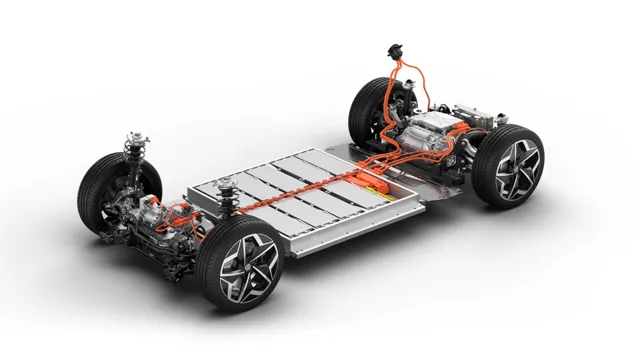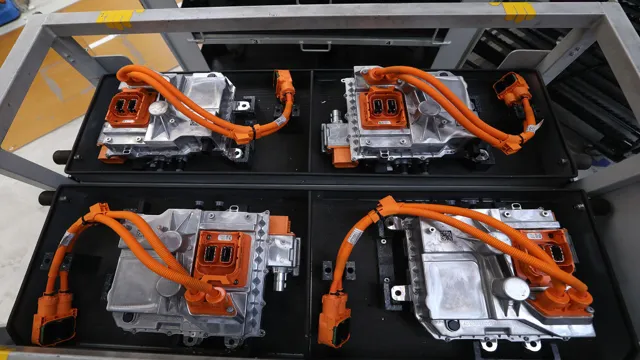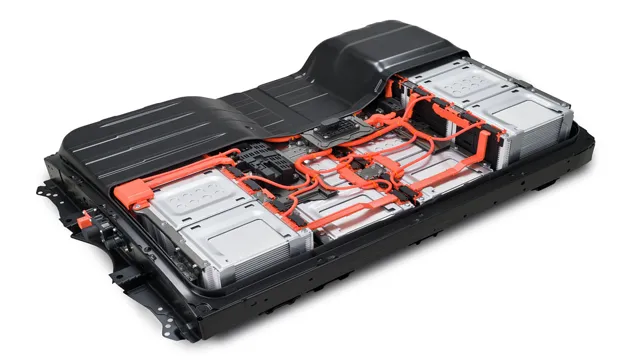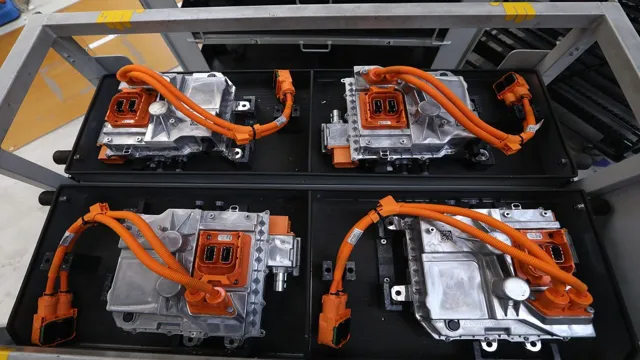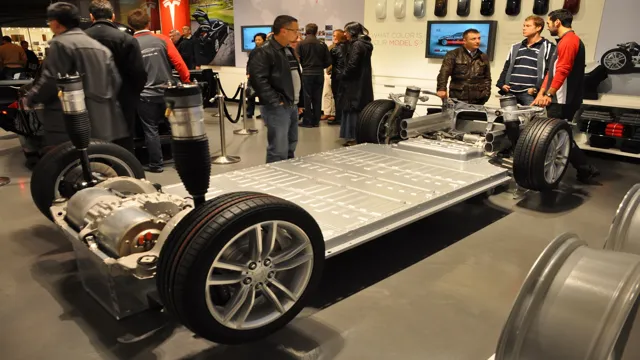The Power Within: Understanding the Battery Specifications of an Electric Car
Have you ever heard of electric cars that have batteries instead of gas tanks? These battery-operated vehicles are becoming increasingly popular as a more environmentally-friendly and sustainable mode of transportation. The battery is the heart of an electric car, defining its power, range, and performance. But what are the specifications of an electric car battery? To start with, the most common type of battery used in electric vehicles is the lithium-ion battery.
These batteries are preferred due to their high energy density, longer lifespan, and faster charging capabilities. The energy density of these batteries is measured in watt-hours (Wh) and determines the amount of energy stored in the battery. Aside from the energy density, the battery’s capacity is also an essential specification.
The capacity is measured in kilowatt-hours (kWh) and determines the total energy the battery can hold. A higher capacity battery will provide longer range and more power, making it ideal for those long road trips. The battery’s power output is also a vital specification, measured in kilowatts (kW).
It determines the amount of power the battery can deliver at any given time, which is essential in high-performance electric vehicles. In conclusion, understanding the specifications of an electric car battery is crucial in choosing the right vehicle that fits your needs. Whether you’re looking for a car with a longer range or a higher power output, these specifications will help you make an informed decision.
Battery Capacity
When it comes to electric cars, one of the most important battery specifications to consider is the capacity. The larger the battery capacity, the further the car can travel on a single charge. This is measured in kilowatt-hours (kWh), with larger batteries often being 60 kWh or more.
However, the capacity isn’t the only factor influencing the range of an electric car, as variables like driving style, weather conditions, and other energy-consuming features can impact the battery life. That being said, it’s still essential to choose a car with a battery capacity that suits your needs, especially if you plan on doing a lot of long-distance driving. Keep in mind that larger battery capacities can increase the upfront cost of an electric car, but they may save you money in the long run through reduced charging times and fewer recharges needed.
Ultimately, it’s all about finding the right balance between battery capacity, range, and budget.
How much energy can the battery store?
Battery capacity refers to how much energy a battery can store. It is typically measured in ampere-hours (Ah) or watt-hours (Wh). The higher the capacity, the more energy the battery can store and the longer it will last.
The capacity varies depending on the type of battery and its size. For example, a small cell phone battery may have a capacity of around 3,000 mAh, while a larger car battery may have a capacity of 50 Ah or more. It’s important to note that battery capacity does not necessarily equate to battery life.
The lifespan of a battery also depends on factors such as usage patterns, charging habits, and environmental conditions. When considering a battery, it’s important to balance capacity with other factors such as cost, weight, and performance to find the best fit for your needs.
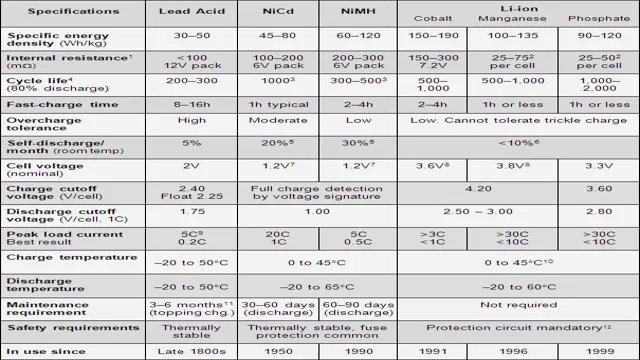
What is the range per charge?
Battery capacity is one of the key factors in determining the range per charge for electric vehicles. Simply put, the more energy that the battery can store, the further the car can travel before needing to be recharged. For example, a vehicle with a 100 kWh battery pack will generally have a longer range per charge than a vehicle with a 50 kWh battery pack.
However, it’s important to note that other factors also play a role in determining the range per charge, such as the vehicle’s weight, aerodynamics, and driving style. Ultimately, the range per charge can vary widely depending on the specific make and model of the electric vehicle. Nevertheless, advancements in battery technology are constantly increasing the capacity of modern electric vehicle batteries, which in turn, is improving the driving range of electric vehicles and ultimately helping to make this technology more accessible and practical for everyday drivers.
Battery Type
When it comes to electric cars, the battery type and specifications are a crucial consideration. Different automakers use different battery technology, such as lithium-ion, nickel-metal hydride, or solid-state batteries. Lithium-ion batteries are the most common type used in electric vehicles, thanks to their high energy density and low maintenance requirements.
Nickel-metal hydride batteries are also used, although they have a lower energy density but are more stable and reliable. Solid-state batteries are still in the development stage but offer even higher energy density than lithium-ion batteries, which means a longer range for electric vehicles. When choosing an electric car, it’s important to consider its battery type and specifications to ensure that it meets your driving needs.
Factors to consider include the driving range, charging time, and battery capacity, among others. By understanding the different types of batteries available and their specifications, you can make an informed decision on which electric car to buy.
What type of battery does the car use?
When it comes to electric cars, one of the most critical components is the battery. The battery is responsible for powering the electric motor that drives the car, and it needs to be reliable and long-lasting. There are several types of batteries that can be used in electric cars, and each has its pros and cons.
The most common type of battery used in electric cars is a lithium-ion battery, which is the same type of battery used in smartphones and laptops. Lithium-ion batteries are lightweight, have a high energy density, and can be recharged quickly. They are also relatively safe and don’t contain toxic materials.
However, they can be expensive to produce and have a limited lifespan. Other types of batteries used in electric cars include lead-acid batteries and nickel-metal hydride batteries. Lead-acid batteries are the oldest and cheapest type of battery and are often used in low-cost electric cars.
However, they are heavy, have a low energy density, and are not very efficient. Nickel-metal hydride batteries are more expensive than lead-acid batteries but are more efficient and have a longer lifespan. Ultimately, the type of battery used in an electric car depends on several factors, including cost, performance, and safety.
What is the lifespan of the battery?
When it comes to the lifespan of a battery, it really depends on the type of battery you are using. Different battery chemistries have varying lifespans and it’s important to choose the one that best fits your device’s needs. For example, lithium-ion batteries, which are commonly used in smartphones and laptops, have an average lifespan of 2-3 years.
Meanwhile, lead-acid batteries, commonly found in cars and other vehicles, can last anywhere from 3-5 years. Of course, factors such as usage habits and charging patterns can also affect the longevity of a battery. To ensure that you get the most out of your battery’s lifespan, it’s recommended to follow proper charging and maintenance practices, such as avoiding extreme temperatures and not overcharging or deep-discharging the battery.
Whether you’re using rechargeable or non-rechargeable batteries, it’s important to keep in mind the type and care of your battery for optimal lifespan and performance.
Charging Time
When it comes to the battery specifications of an electric car, one of the most important things to consider is charging time. While traditional gas-powered cars can be refueled in just a few minutes, electric cars can take much longer to charge up. This is because electric cars rely on rechargeable batteries, which store energy that is used to power the vehicle.
Typically, it takes a few hours to fully charge an electric car battery, although this can vary depending on the specific make and model of the car, as well as the type of charger being used. Some electric cars also come equipped with fast charging capabilities, which can reduce charging time to just a matter of minutes. However, it’s important to note that fast charging can put more strain on the battery and may reduce its overall lifespan.
To ensure that your electric car battery lasts as long as possible, it’s best to avoid frequent fast charging and instead opt for slower, steady charging whenever possible.
How long does it take to fully charge the battery?
When it comes to charging your device’s battery, the time it takes will depend on various factors such as the size of the battery and the charging speed of the device. For example, a smaller battery may take less time to charge than a larger battery. Furthermore, if your device supports fast charging, you can expect to have a full battery within an hour or two.
On average, it may take anywhere from 2-4 hours to fully charge a standard-sized smartphone battery. However, if you want to tip the scales in your favor, you can do a few things to reduce charging time. For instance, avoid using your phone while charging, switch to airplane mode, and don’t let your battery drain completely before charging.
As for other devices, such as laptops, tablets, and smartwatches, the charging time will depend on the battery size and charging capacity of each device. Some laptops may take up to 6 hours to fully charge, while others can reach a full battery capacity in just 2 hours. In conclusion, charging time will vary depending on the device and battery size, but with the right charging techniques, you can reduce the charging time and have your device back to full capacity in no time.
Always refer to the device manual for manufacturer recommendations on charging time.
What types of charging options are available?
When it comes to charging options for electric vehicles, there are a few different types to consider. One important factor to consider is charging time. The time it takes to fully charge your EV will depend on the type of charger you’re using.
Standard Level 1 chargers can take up to 20 hours to fully charge your vehicle, while Level 2 chargers can take anywhere between 3-12 hours depending on your car’s battery size. DC fast chargers are the fastest option, typically taking around 30 minutes to reach an 80% charge. However, it’s important to note that these fast chargers are less common and may come with additional costs.
Ultimately, the charging option you choose will depend on your specific EV and your charging needs. It’s important to do your research and explore different options to determine which one is best for you.
Warranty
When it comes to electric cars, battery specifications are one of the most important considerations for buyers. Not only do they determine the driving range and overall performance of the car, but they also have an impact on the car’s warranty. Most electric cars come with a battery warranty that covers defects and other issues that may arise with the battery.
However, it is important to note that the warranty may vary depending on the battery’s specifications. For instance, some batteries may have a longer warranty period or be covered for a greater distance than others. Before purchasing an electric car, it is important to research the battery specifications and warranty to ensure that you are getting the best possible deal.
By doing so, you can have peace of mind knowing that your investment is insured against any potential issues with the battery.
What kind of warranty does the battery have?
When it comes to buying an electric car, one of the most important aspects that customers need to consider is the warranty offered on the battery. After all, it is the most expensive component of the vehicle and is crucial to its performance. Most electric cars come with a warranty that ranges from 8 to 10 years and covers issues related to defects or malfunctions.
This means that if there is an issue with the battery during this time, the manufacturer will repair or replace it at no cost to the owner. However, it is important to note that the warranty may not cover issues caused by normal wear and tear or misuse. Additionally, some manufacturers might offer an extended warranty for an additional cost, which may provide more comprehensive coverage for a longer period.
It is always a good idea to check the warranty details carefully before making the final decision to purchase. Overall, a good warranty on the battery is essential for peace of mind and can help save considerable money in case of any issues.
Conclusion
In conclusion, the battery specifications of an electric car can be compared to a superhero’s powers. Just like how a superhero needs super strength, speed, and endurance to save the day, an electric car needs a high capacity, fast charging, and long-range battery to conquer the roads. So, next time you see an electric car zoom by, remember it’s not just an ordinary vehicle – it’s a superhero on wheels!”
FAQs
What is the battery capacity of an electric car?
The battery capacity of an electric car varies depending on the make and model, but it typically ranges from 30 to 100 kWh.
How long does it take to charge an electric car’s battery?
The charging time for an electric car’s battery can vary depending on the charger type and the car’s battery capacity. On average, it takes about 4 to 8 hours to charge an electric car’s battery using a Level 2 charger.
What is the lifespan of an electric car’s battery?
The lifespan of an electric car’s battery depends on several factors such as usage, environmental conditions, and battery type. Generally, most electric car batteries last between 8 to 10 years.
Can I replace the battery in my electric car?
Yes, the batteries in electric cars can be replaced. However, battery replacement can be expensive and is often not necessary until after the car’s warranty has expired. It is recommended to consult with a certified mechanic or dealership for battery replacement.

